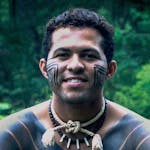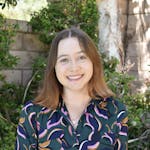We can’t live without nature’s help, and nature can’t live without our help. We must protect our planet’s biodiversity to safeguard the future of our ecosystems, our climate, our health, and our humanity. In this special series, the UN Foundation commissioned five Indigenous photographers to show how their communities and families are at the heart of the struggle to save the world’s wild places, under threat like never before. Words and pictures by Kynan Tegar, edited for length and flow.
On the island of Borneo, near the border between Indonesia and Sarawak, Malaysia, there’s a small village called Sungai Utik. There, the Dayak Iban who call it home have inhabited and protected their customary territory for more than 130 years.
As a member of the community I feel truly thankful and really proud of our elders who have protected our lands from illegal logging and companies trying to come into our customary land. They never gave up their struggle so that to this day, our forests are still here and our rivers are still clear.
It’s our task to continue what they have been doing. To protect these customary territories and forests, because one of the values that our elders teach us is that the land is our mother, the forest is our father, and the river is our blood.
In Sungai Utik, we have our customary territory divided up into three zones: there’s a protected forest, a reserve forest, and a productive forest. The forests provide us with everything we need.
The protected forest protects our source of clean water. In the reserve forest, we can find all sorts of fruits and plants to make our crafts. And in the production forest is where we get our wood, and wood harvested from there is strictly for building, it’s never to be sold. All that we have to do is take it, but we only take what we need and no more, always harvesting sustainably. One of the rules of the village is that if you cut down one tree, you plant two more.
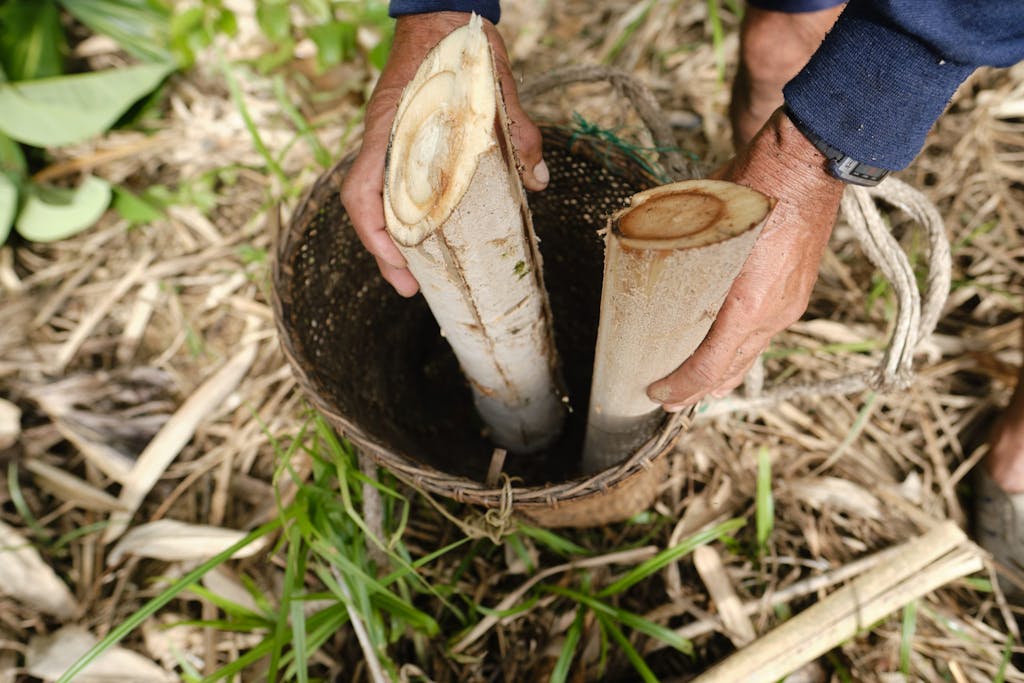
The edible Entibab palm has been harvested by the Dayak Iban people for generations
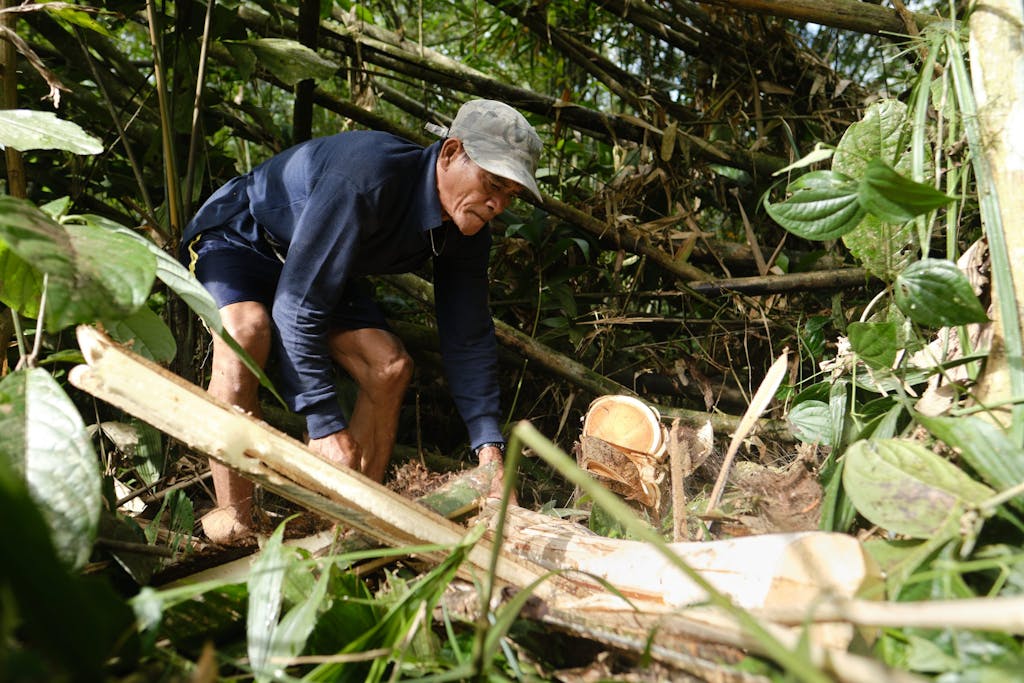
Dayak Iban man harvests edible Entibab palm from his people’s territory.
Another tradition that we still practice is our traditional rotation way of farming. This is a tradition that has been passed down to us from generation to generation. For more than hundreds of years we have done it this way.
Every few years, after they finish harvesting the paddy rice from one field, they leave it to regain its fertility and move to another field that has been left before. It can be for only five years or for more than 40 years. By doing this we produce enough paddy rice to sustain our village of around 300 people. And in these fields they plant more than just paddy; there you can find many varieties of vegetable plants, edible palm plants, plants for seasoning, and mushrooms.
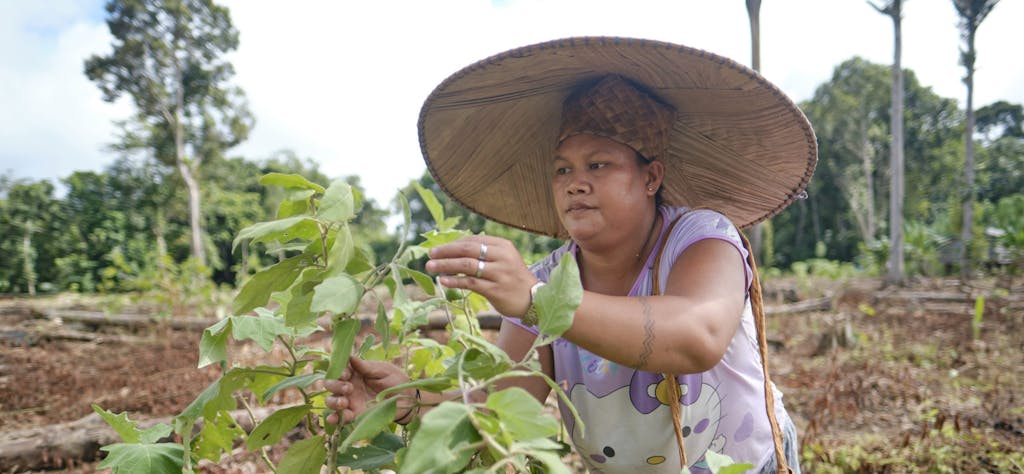
A Dayak Iban woman picks vegetables from Sungai Utik fields.
At the nearby river, you can find fresh fish, and in the forest you can find game animals. These have been the basis of the Dayak’s diet for a long time.
And now, one of the most important things to us, and the thing we have been fighting more than 20 years for, is our land rights. And last May we finally received it: legal recognition, from the government, of our customary forest.
With this we are now responsible for managing our own forest, with our own traditional beliefs, and our own way of life. And to ensure the future of our descendants so that they can also enjoy this pristine nature.
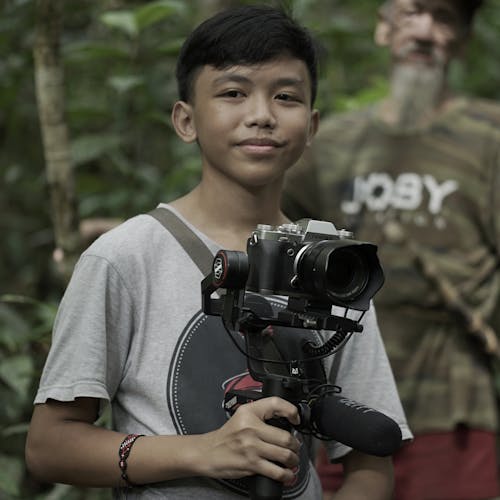
MORE ABOUT THE PHOTOGRAPHER
Kynan Tegar is a 15 year old filmmaker and photographer. He is a member of the Dayak Iban tribe from the village of Sungai Utik in West Kalimantan, Indonesia. Since finishing primary school he has pursued his passion for photography, videography, nature and learning in-depth about the culture of the Iban people.
Through his films and pictures, Kynan hopes to document the traditions, beliefs, and stories of the Dayak Iban to pass down audio-visually to the next generation. He wants to share with the outside world the vast traditional knowledge that his community has regarding the forest, what lies within it, and how to manage it. He also hopes that sharing the story of the Dayak Iban’s fight for their territory will inspire other Indigenous communities going through similar struggles.
View more of Kynan’s photography at @kynantegar on Instagram.
Media content supported by Indigenous led charity If Not Us Then Who?


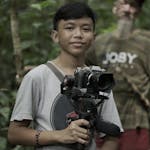
 View All Blog Posts
View All Blog Posts